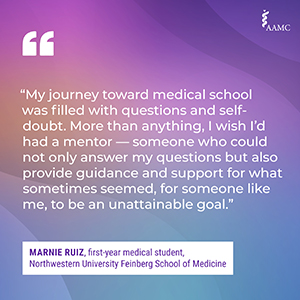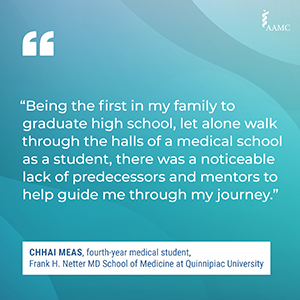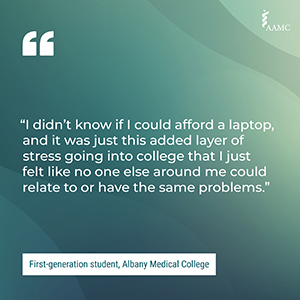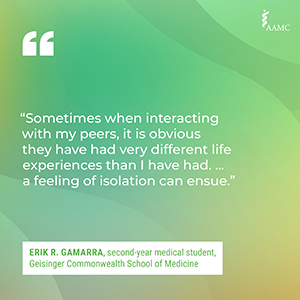Tools and Resources for First-Generation Medical School Students
As a first generation student in medical school, you may not know what you don’t know.
As a medical student, you are joining a professional culture where relationships formed with supervisors can be very important for career mentorship and letters of recommendation. How do you dress in the professional environment? What is expected of you in the clinic and in the hospital? Are you fully oriented to be successful?
The resources in this online toolkit may be useful for students, medical school professionals, and families of students who seek to support, guide, and advocate for first-generation students as they navigate through medical training. More specific information for advisors and families is available on the advisor page.
Discover resources by topic:
Academic Support

#1 Academic Support Resource: Your School’s Office of Academic Affairs and Student Affairs
Knowing the programs that already exist on your campus is the first step. Potential resources available may include:
- Pre-matriculation programs for students to enhance their skillsets and ensure their preparation for continued study. These programs can be especially helpful for students who were non-science majors or have been away from the academic environment for a period of time.
Many programs specify eligibility criteria, but any student interested in the program should contact the program director to express interest. Programs often include such topics as learning and study skills, time management, test-taking strategies, practice coursework, success strategies, and professional development workshops.
- Academic coaches who regularly check in with students to understand their progress and address their personal development needs.
- Peer and group tutoring services can provide a format for individualized or group instruction and tips from more senior medical students who have gone through the curriculum previously.
- Upper level students often create drives of information to help all students with resources, questions, study tools, etc. Find out what resources are available.
- Learning Specialist Consultations may be available through your medical school or university. They provide group instruction or individualized assistance with academic success skills such as creating a study plan, test taking strategies, exploring learning styles, and time management.
- Neuropsychological Assessment may be beneficial for assessment of a learning disorder or disability.
Other Resources
- Osmosis: Surviving & Thriving in the First Year of Medical School
- Osmosis: The Road to Residency
- Geisinger Commonwealth School of Medicine
- Information about the First-Generation and Ally Student Support Committee and a wealth of online information for first-generation students and institutions trying to support students.
Professional Development and Career Mentorship

Opportunities
AAFP: Finding a Mentor in Medicine
For medical students, having a physician who serves as a mentor may be one of the most valuable resources on the path to becoming a doctor. Mentoring relationships are particularly important for minority students or students who are in medical schools that do not have a department of family medicine.
American Association of Physicists in Medicine
Provide opportunities for students to find career mentorship opportunities by participating in paid grant and fellowship programs.
AAMC: Summer Enrichment and Pipeline Programs
A database of resources sponsored by the Association of American Medical Colleges to help students locate enrichment programs.
AAPC: Advancing the Business of Healthcare
Mentoring is an active partnership between committed AAPC members to foster professional growth and career development. Additional information on the AAPC mentorship experience can be found in the FAQ.
AMOpportunities
AMO partners with a diverse range of companies to give students exclusive benefits from discounted test prep to educational services. They want to make sure to provide students with useful resources that will ultimately guide students in their medical journey and continuing education.
FARMS Database
The Funded Away Rotations for Minority Medical Students (FARMS) Database is a directory of programs offering financial support to students underrepresented in medicine wishing to participate in visiting electives. The database was compiled by Rodrigo Munoz, a fourth-year medical student at the University of Alabama at Birmingham and was supported by DocSpace founder and CEO, Mario Amaro, MD.
Medical Research Clinical Research Mentorship
A major goal of the Medical Research Program is to support the development of physician scientists. At this time, with our limited resources, the foundation is planning to develop programs for other stages along the physician-scientist career track where support is needed.
MiMentor
MiMentor is a national mentoring organization committed to mentoring the next generation of healthcare professionals. Their mission is to develop and support innovative and inclusive mentorship opportunities that will inspire the next generation of diverse healthcare leaders for underserved communities.
Student-Based Organizations
- The Student National Medical Association (SNMA): The oldest and largest student run organization focused on the needs and concerns of medical students of color. SNMA is committed to supporting current and future underrepresented minority medical students, addressing the needs of underserved communities, and increasing the number of clinically excellent, culturally competent and socially conscious physicians.
- Building the Next Generation of Academic Physicians (BNGAP)
- Latino Medical Student Association (LMSA): The Latino Medical Student Association (LMSA) Mission is to unite and empower medical students through service, mentorship and education to advocate for the health of the Latino community.
- FGLIMed: The National First Generation in Medicine Association (FGLIMed) is a network comprising first-generation and low-income (FGLI) medical students, as well as physicians and faculty in medical schools who identify as such or support related efforts throughout the United States and Puerto Rico.
-
Association of Native American Medical Students (ANAMS): The Association of Native American Medical Students (ANAMS) is a student organization representing Native American graduates, health professionals and students throughout the U.S. and Canada. Their goals include providing support and resources for all Native Americans currently enrolled in various allied health professions schools.
-
Asian Pacific American Medical Student Association (APAMSA): The Asian Pacific American Medical Student Association (APAMSA) is a national organization of medical and pre-medical students committed to addressing the unique health challenges of Asian and Pacific Islander American (APIA) communities. APAMSA serves as a forum for student leaders to engage these health issues and develop initiatives and projects addressing those needs. The local, regional, and national activities of APAMSA aim to promote the health of the APIA community and help healthcare workers understand how to care for APIA patients in a culturally sensitive manner.
Selected Student Reflections
- Finding success as a first-generation medical student, AAMC News
- FirstGenMedicine: A free website that allows students who are applying to medical school an opportunity to ask questions about what classes to take, how to be actively involved on campus and off-campus, how to prepare for the MCAT, and how to ultimately apply to medical schools.
- Real-life Advice from First-Generation College Students Who Made it to Med School: For the first people in their families to attend or complete college, the notion of med school might seem daunting, three U-M students share tips for success.
Emotional Support

Your Office of Student Affairs / Office for Diversity
Many institutions are adopting best practices that celebrate and advocate for the unique strengths of first-generation students and encourages them to use their talents to enhance the medical school experience.
Visibility and peer relationships could be one of the first starting points towards emotional health. A student organization focused on supporting first-generation college graduate students in medicine is fundamental. However, regardless if there is a student group or not, student affairs and diversity offices should have ongoing meeting and check-in with first-generation students.
Some medical schools with first-generation college graduate student groups that you can reach out to for questions (full list can be found on FGLIMed.org):
- Albany Medical College
- Columbia University Vagelos College of Physicians and Surgeons
- Geisinger Commonwealth School of Medicine
- Georgetown University School of Medicine
- Indiana University School of Medicine
- UCLA David Geffen School of Medicine
- University of Massachusetts Medical School
- Perelman School of Medicine at the University of Pennsylvania
- Yale School of Medicine
Specific example activities from first-generation student groups:
- FGLIMed: The National First-Generation and/or Low-Income in Medicine Association hosts monthly virtual social hours. This can be expanded to include virtual lunch or dinner sessions as well.
- Yale School of Medicine: Yale First-generation and Low-income student affinity group (YFLI) holds monthly community dinners, funded by the diversity office, for students to gather and talk about their experiences in class, on the wards, and throughout medical training.
- UCLA David Geffen School of Medicine organizes a community dinner during the first week of school. UCLA also hosts a formal dinner for graduate students with the explicit goal of teaching students about the etiquette of formal dining.
- Geisinger Commonwealth School of Medicine holds a bi-monthly I'm First Mentorship Group over the lunch period with catered food, speakers and student open dialogue. Additionally, a large celebration for first-generation students and their families is held prior to graduation. At the ceremony the families are asked to participate in the ceremony to recognize their first-generation students with special stoles. Graduates are encouraged to wear the stoles with their cap and gowns at commencement and the Dean highlights the special ceremony during his commencement speech.
Online mental health resources
- Emotional Intelligent EQ: Emotional Intelligence is the "something" in each of us that is a bit intangible. It affects how we manage behavior, navigate social complexities, and make personal decisions that achieve positive results. EQ Is made up of four core skills that pair up under two primary competencies: personal competence and social competence.
- Mental Health First Aid: Mental Health First Aid Is a skills-based training course that teaches participants about mental health and substance-use Issues.
- Calm.com
- Headspace.com
- American Psychological Association
Med Legs Podcast: Finding Your Footing as a First-Generation and/or Low-Income Student in Medicine
This podcast aims to increase awareness of the narratives of first-generation and/or low-income (FGLI) medical students and to build a community of support for FGLI individuals through the creation of an accessible, free resource that allows listeners to hear from guests and the hosts on a number of FGLI-related topics, including FGLI success stories, advice related to applying to medical school and adjusting to life in those spaces, resources and programs available to FGLI students, building one’s network and brand, etc. Listen now on Apple Podcasts.
Financial Support

#1 Financial Resource: Your Institution’s Financial Aid Office
Your school’s financial aid office team and their publications are your go-to resource for all things financial aid at your college. Many medical school financial aid offices host local workshops or webinars on budgeting, money management, repaying debt and other financial wellness topics and individual financial counseling.
How financial aid in medical school differs from undergraduate financial aid
Graduate/Professional students are considered to be independent students for Title IV federal student aid. They are not eligible for a Federal Pell Grant, a Federal Supplemental Opportunity Grant (FSEOG) or a Federal Subsidized Stafford Loan. Their parents are not eligible for Federal PLUS loans.
However, the student can apply for Federal Unsubsidized Stafford Loans, Federal Graduate PLUS loans and Federal Work-Study. Students should read their Financial Aid Office’s application requirements to ascertain if their school requires parental information to determine eligibility for institutional and Federal Title VII funds.
How to Determine Your Eligibility for Financial Aid
The best way to determine your financial aid eligibility is to apply. At a minimum, students should complete the Free Application for Federal Student Aid (FAFSA), Federal Entrance Counseling and Federal Master Promissory Note(s). You should read the correspondence and guides provided by your financial aid office to determine if there are school-specific applications that they require.
Association of American Medical Colleges’ (AAMC) Resources
- AAMC’s FIRST
- AAMC’s financial aid page provides multiple links with unbiased, reliable guidance regarding financing medical school.
- Sample Financial Planning Checklist (PDF)
- AAMC Financial Wellness is a service that allows students to create a personal account to measure their financial health, receive personal feedback, set financial goals, review progress, and ask questions of an AAMC expert at any time through a secure messaging system.
- Financial aspects of transitioning to medical school: This provides financial advice for a student who has recently been accepted into medical school, including accepting financial aid, deferring undergraduate loans, budgeting, and organizing healthcare records.
- AAMC Medical School Survival Guide: Get tips on reducing debt, a video on money management, resources to help students create a budget, and the cost of applying to residency.
- Webinars: Users can learn about a range of topics through comprehensive webinars and quick clips. Additionally, they can access general advice from medical school students and residents.
Popular Loan Programs
Federal Direct Unsubsidized loans
Federal Direct Unsubsidized Loans are non-credit based loans that are based upon the borrower’s Cost of Attendance (COA) and federal annual and aggregate loan limits. Interest accrues during periods of non-payment such as when you are enrolled in school or during other periods of authorized deferment. Borrowers do not have to begin making payments until six months after the student graduates or otherwise ceases to be at least a half-time student.
HRSA Primary Care Loan (PCL)
PCL provides low-interest rate loans to full-time students pursuing an allopathic or osteopathic degree. Students and/or parents, as applicable, must meet income guidelines. Eligible students must agree to enter and complete residency training in primary care within four years of graduation and practice primary care for ten years or until the loan is paid in full. Funds are limited. Students should refer to their financial aid office for institution-specific application and availability of funds.
Federal Direct Grad PLUS Loans
Federal Direct grad PLUS are unsubsidized federally guaranteed loan funds that require a credit check to ascertain if the applicant has an adverse credit history. If a student has an adverse credit history, the student may still be able to receive a PLUS loan if they meet additional requirements.
Qualified students may receive a maximum of the difference between all other financial aid and the cost of attendance. Interest accrues during periods of non-payment, such as when you are enrolled in school or during other periods of authorized deferment. Borrowers do not have to begin making payments until six months after the student graduates or otherwise ceases to be at least a half-time student.
For more information on grad PLUS, including current interest rates, visit: https://studentaid.gov/understand-aid/types/loans/plus/grad.
The student’s credit score is needed for this loan. About Credit Scores:
- Federal Trade Commission website includes information about ordering a free annual credit report
- This article reviews free apps that will automatically monitor a credit score.
- Loans for Disadvantaged Students (LDS): LDS provides low-interest rate loans to full-time students pursuing an allopathic or osteopathic degree. Parents must meet strict income guidelines. Funds are limited. Students should refer to their financial aid office for institution specific application and availability of funds.

Loan Alternatives
The AAMC discusses seven ways to lower medical school debt, including applying for aid, choosing the right repayment plan, improving financial literacy and more.
Loan Repayment/Deferment
AAMC Educational Debt Manager
This comprehensive financial guide helps medical school students navigate medical school financing options and methods for borrowing and repaying student loan debt. It is available for free download.
Loan Deferment options
Loan deferment options are also discussed in the AAMC’s free Education Debt Manager described above. This resource also covers managing debt during and after medical and/or graduate school.
US Department of Education Loan Repayment Guide
This US Department of Education resource provides an overview of the loan repayment options available for students. It compares and contrasts loan repayment options, and discusses choosing a repayment plan, how to make payments, and what students should do if they fall short of making their monthly payments.
Tracking Loans and viewing payment options
The MedLoans® Organizer and Calculator (MLOC) is a tool that may be used to assist medical students and residents in managing their educational debt. The MLOC provides a secure location to organize and track student loans. It displays repayment plans and costs options tailored to the borrower’s student loan debt.
Note: many private loans and bank loans may not be deferrable.
Please note: this toolkit is not intended to endorse expressed views, products, or services offered on these sites or in these documents. Availability of resources may change over time. To suggest edits or updates to this page, please contact educationalaffairs@aamc.org.
Authors:
- Carina Abreu, MD Candidate, Class of 2022, Albany Medical College
- Jacob M. Altholz, Medical Student and OSR Representative, Uniformed Services University of the Health Sciences
- April O. Buchanan, MD, Associate Dean for Curriculum and Professor of Pediatrics, University of South Carolina School of Medicine Greenville
- Alejandra Casillas MD, MSHS, Assistant Professor of Medicine in Residence, UCLA First Gen Advisory Board, First Gen Med Faculty Advisor, David Geffen School of Medicine at UCLA
- Michele Cerasani, MD Candidate, Class of 2022, Albany Medical College
- Lisa Coplit, MD, Associate Dean for Faculty Development, Frank H. Netter MD School of Medicine
- Conroy Green, Associate Director of Financial Aid, Albany Medical College
- Ann Loughman, Director of Financial Affairs, Albany Medical College
- Hyacinth R. C. Mason, PhD, MPH, CHES, Assistant Dean, Student Support and Inclusion, Albany Medical College
- Mytien Nguyen, M.Sc, MD/PhD Student, Yale School of Medicine
- Enxhi Rrapi, MD Candidate, Class of 2023, Albany Medical College
- Vicki T. Sapp, PhD, Director for Student Engagement, Diversity and Inclusion & Assistant Professor, Geisinger Commonwealth School of Medicine
- Toshiko Uchida, MD, Associate Professor of Medicine and Medical Education, Northwestern University Feinberg School of Medicine
Working Group Members
- Jacob M. Altholz, Medical Student and OSR Representative, Uniformed Services University of the Health Sciences
- April O. Buchanan, MD, Associate Dean for Curriculum and Professor of Pediatrics, University of South Carolina School of Medicine Greenville
- Alejandra Casillas, MD, MSHS, Assistant Professor of Medicine in Residence, First Gen Advisory Board, First Gen Med Faculty Advisor, UCLA David Geffen School of Medicine
- Lisa Coplit, MD, Associate Dean for Faculty Development, Frank H. Netter School of Medicine at Quinnipiac University
- Abraham Gallegos, MD, NIH National Research Services Award Research Fellow and Clinical Instructor, Pediatrics, UCLA David Geffen School of Medicine
- Hyacinth R. C. Mason, PhD, MPH, CHES, Associate Professor and Assistant Dean Student Support and Inclusion, Albany Medical College
- Christopher McKnight, Program Specialist for the Medical Education Division, AAMC
- Mytien Nguyen, MS, MD/PhD Student and FGLIMed Founding President, Yale School of Medicine
- Vicki T. Sapp, PhD, Assistant Professor and Director Student Engagement, Diversity and Inclusion, Geisinger Commonwealth School of Medicine
- Toshi Uchida, MD, FACP, Chair, Associate Professor and Leader of Clinical Medicine Element, Northwestern University Feinberg School of Medicine
Thank you to our reviewers: Meredith Bazemore, Director, Office of Rural Initiatives, University of North Carolina School of Medicine; Dr. Rebecca Dougherty, Co-Director, Advanced Clinical Experience, Donald and Barbara Zucker School of Medicine at Hofstra/Northwell; Dr. Sara Hughes, Associate Dean of Education and Student Affairs in the UCSF School of Dentistry; Rafaella Faria, First Year Medical Student at the University of North Carolina School of Medicine; Dr. Priti Mishall, Associate Professor of Anatomy and Structural Biology and Ophthalmology and Visual Sciences at Albert Einstein College of Medicine; Dr. Sharon Younkin, Chief of Staff for Medical Education, David Geffen School of Medicine at UCLA; Dr. Doreen Olvet, Assistant Professor, Department of Science Education, Donald and Barbara Zucker School of Medicine at Hofstra/Northwell; Dr. Deepan Singh, Associate Dean of Students and Diversity, NYU Long Island School of Medicine; Dr. Jordan Holmes, Assistant Professor of Radiation Oncology at the Indiana University School of Medicine; Katina Kassicieh, Third Year Medical Student at the University of New Mexico School of Medicine; Dr. Steven Shelov, NYU Long Island School of Medicine Dean and Professor of Pediatrics; Dr. Kema Gadson, Assistant Dean for Student Affairs and Diversity, Florida State University College of Medicine; and Dr. Marilyn Katz, Director of Academic and Educational Affairs, University of Connecticut School of Medicine, for their insight and helpful comments on earlier versions of this toolkit.